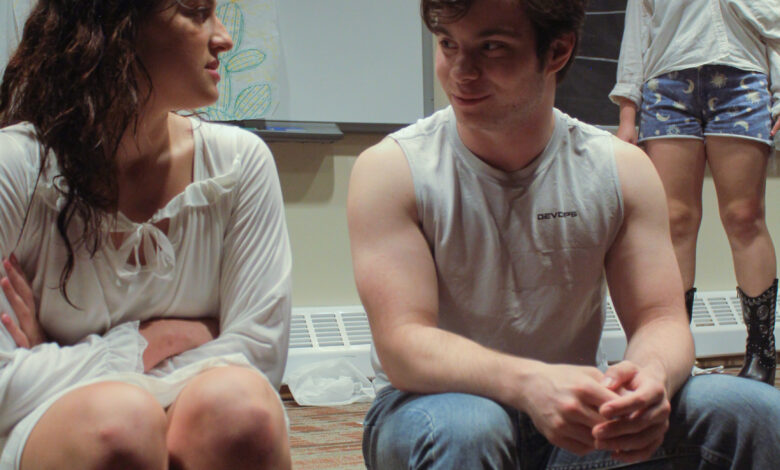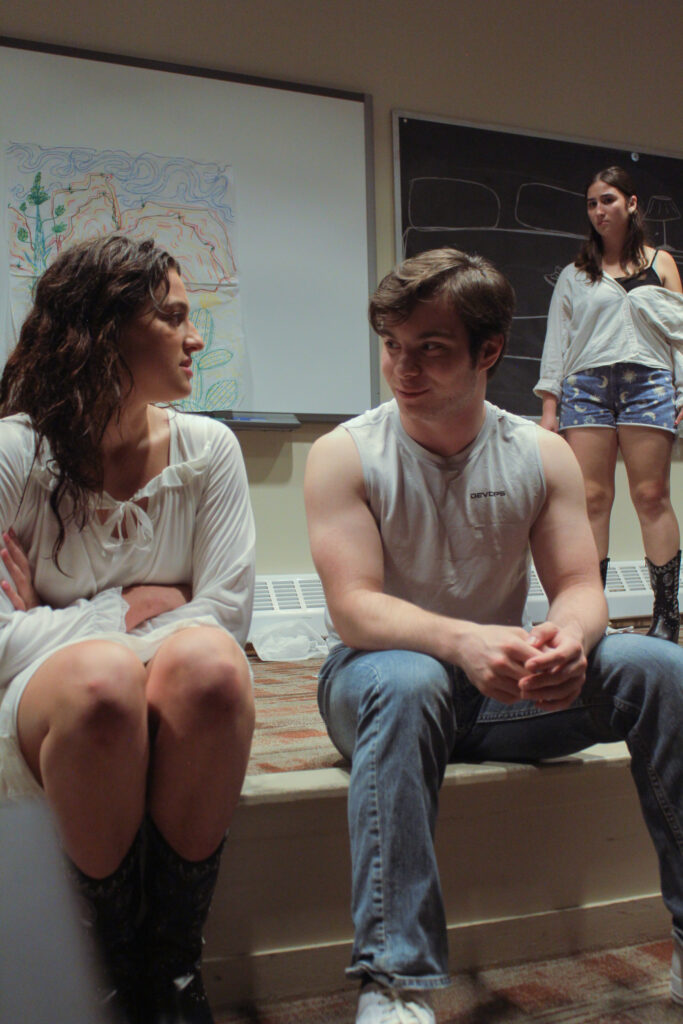
‘Emotional Women’ moves audiences
By Jay Roberson
For centuries, women have struggled to gain control over their own destiny. The original play, “Emotional Women,” written by senior acting major Bella Frost, depicts a Wild West woman from the 1860s, Bea, who makes it her mission to prevent her distant relative, known as Free Ride, from making the same decisions as her, which led to her premature death.
The Rue Auditorium’s set was adorned with drawings of cacti, tumbleweeds, a hotel room and a 7-Eleven in the corner. Though the auditorium did not offer lots of space to expand the set, the actors made up for the lack of set design through their outlandish characters.
As the lights dimmed, the song “Free Ride” by Edgar Winter began playing. Bea, dressed in a fur coat, laid across chairs, appearing to be asleep. Free Ride then entered the scene to assess the situation. Little did she know Bea had been dead for over a century.
Free Ride, who recently dropped out of college due to a mental breakdown, is on a journey of sorts to find herself, bringing her three hours away from home to California. Slowly, Free Ride begins to learn what led up to Bea’s death, which could have easily been prevented.
While on her journey, Free Ride calls up her ex-boyfriend’s brother, Hutton, to accompany and help bring her home from her trip. Little does she know that Hutton is focused on figuring out how to make Free Rider his girlfriend, even in her fragile mental state.

Photo By Hailey Tedesco
Bea’s sister Marj, a god-loving, bible-preaching woman, is an almost perfect foil to Bea, who is having a secret affair with Marj’s husband, Jeb. Jeb promises Bea that he’ll get her out of the town they are in, but this empty promise is what leads Bea to her death.
The relationship between Bea in her spirit form and Free Ride was complex, considering Free Ride wasn’t sure if Bea was a hallucination or not. While Free Ride unpacked past trauma related to the unique struggles of womanhood, Bea was at her side, guiding her through the pain she felt.
Free Ride feels obligated to stay in California until she learns Bea’s full story. Hutton keeps pushing to head home, not aware of her relationship with Bea, who he is not able to see.
Bea gives Free Ride the rundown on her death: a negligent man, who promised her the world, left her to perish on her own. By telling her story, Bea hopes that Free Ride will be able to break the pattern of letting a man control her journey.
The ending was left open, with the audience unsure of the fate of Free Ride as she sits beside Bea’s ghost. Free Ride says, “I can’t remember the last time I had the energy to fight anything.”
In the heat of California, Free Ride suddenly says she’s cold, to which Bea responds with, “Doesn’t it feel nice?”
Despite the fact that the student-written show was put together in just three weeks, “Emotional Women” was a beautiful, intergenerational piece showing the harsh reality of living in a male-dominated world.
Frost announced she is looking to rework the title of her show, but I felt that “Emotional Women” fit the play perfectly. To love and feel with so much intensity is one of the many pleasures of being a woman, but it can easily be viewed as a weakness.
These “Emotional Women” show the reality of living in the patriarchy, where emotions are scrutinized and looked down upon. The most powerful thing a person can do is be emotional, or what’s the point of living?
Jay Roberson is a senior secondary education and English major



